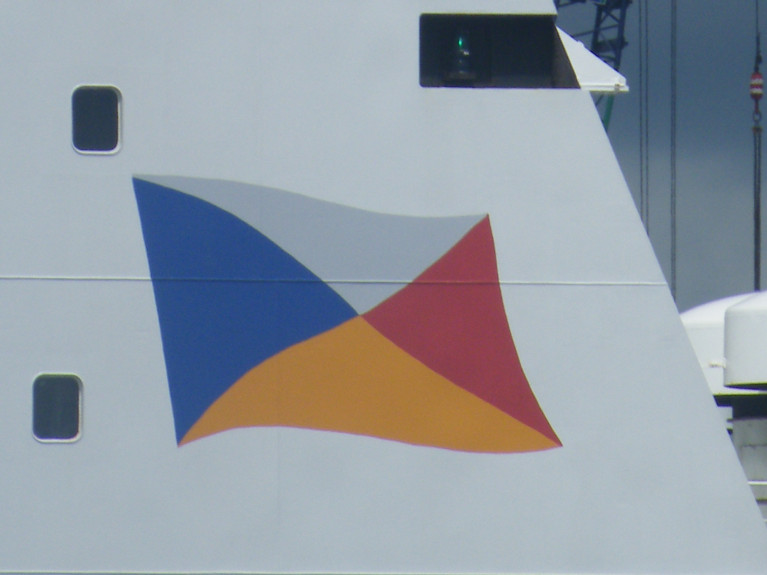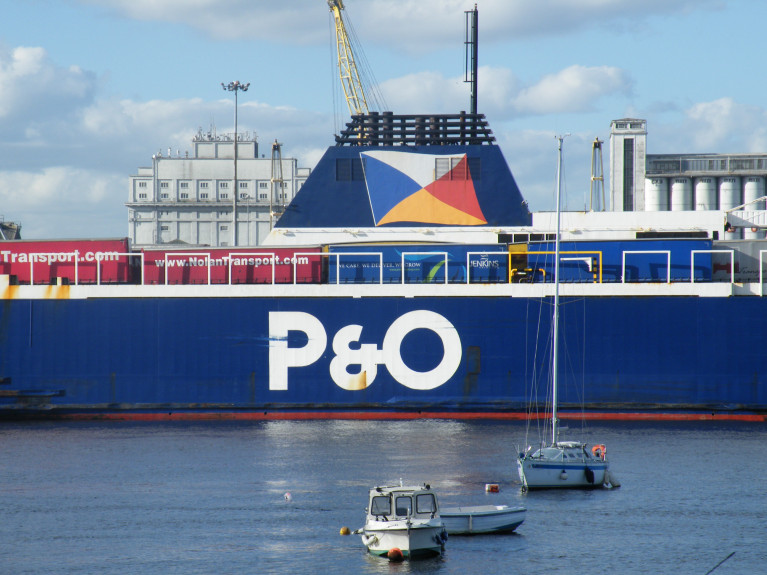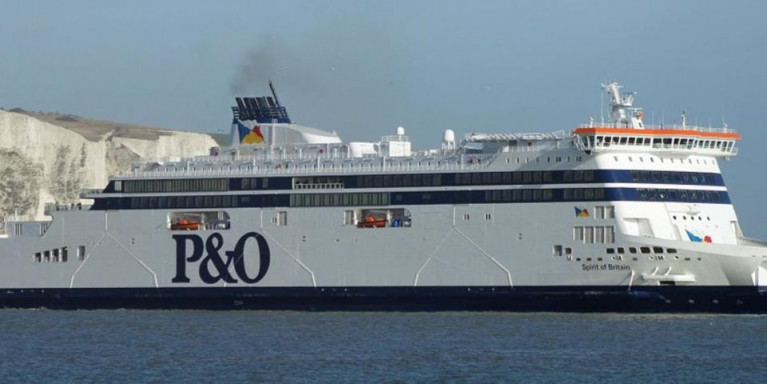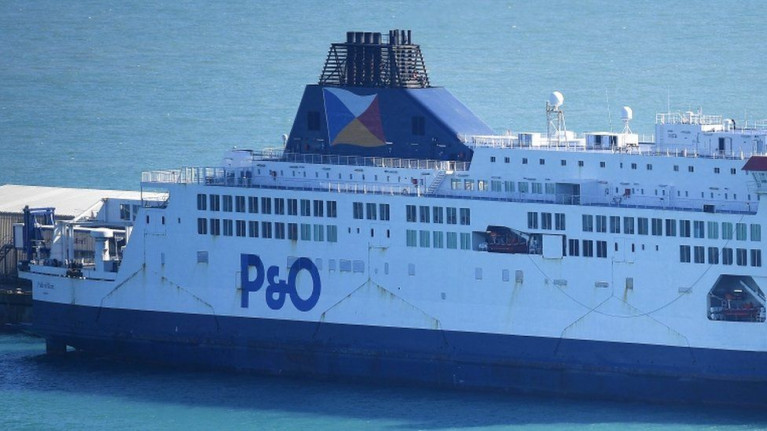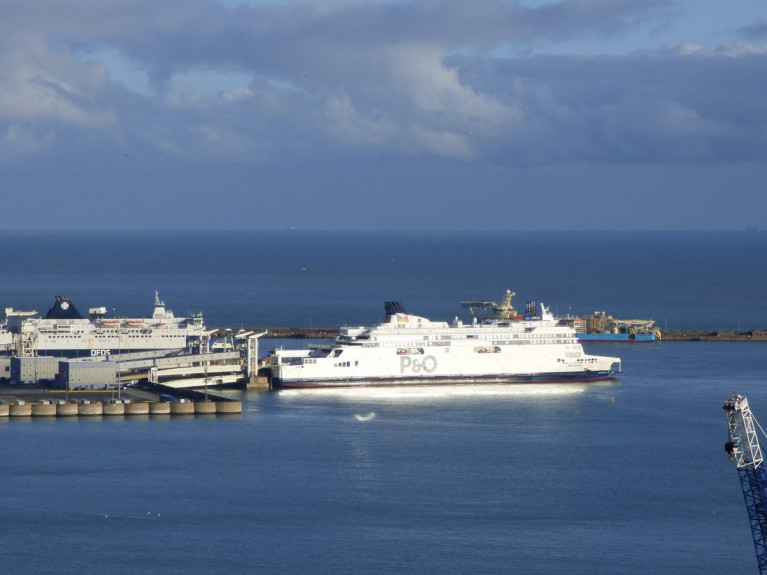Displaying items by tag: P&O Ferries
ICG's Chartered-In Ropax from P&O, Sees Norbay Make Maiden Crossing for Irish Ferries this Afternoon
Irish Continental Group (ICG)’s new time-chartered ropax from P&O Ferries is today making its first sailing for Irish Ferries on the Dublin-Holyhead route, in the context of providing a full service except for ‘foot’ passengers, writes Jehan Ashmore.
The Norbay which is on charter for six-months and with the option to extend, is understood to had previously made several sailings on the Dublin-Holyhead route, albeit based on a freight-only mode. As for this afternoon's departure at Terminal 1’s berth 49, which took place on time at 14.30 as some 20 minutes after the mooring ropes had been cast off from the quay, with the Dutch-flagged vessel observed passing through the entrance of the port.
The 120 trailer unit freight-ferry with a 125 passenger capacity and a P&O crew (at time of writing), is currently crossing the Irish Sea and is scheduled to arrive at Holyhead at 1800hrs.
Since Afloat’s last report, Norbay has been monitored at Dublin Port's berth 33 used by CLdN’s large freight-ferries within Alexandra Basin, during a layover period. This was followed yesterday by taking a river-berth at the former P&O Ferries terminal at North Wall Quay Extension, where Seatruck/CLdN also have their Irish Sea and direct mainland Europe operations, which includes today’s officially opened Terminal 4 (T4) as Afloat reported earlier, where the facility is a redeveloped RoRo freight terminal costing €127m.
On completion of discharging and loading at the north Wales port this evening, Norbay is scheduled to depart at 20:15 and sail on the three-hour 30 minute crossing, returning to Dublin at 23:30. On the next day, in the early hours, Norbay departs at 02:00 hrs and arrives at the Anglesey port at 05:25. The next sailing from Wales is at 08:15 hrs with the freight-orientated ferry to berth in the Irish capital at 11.45 hrs, thus completing the full sailing roster of day and night sailings of the ropax’s introductory of Irish Ferries round-trips.
With Norbay making its debut, Irish Ferries now have three vessels operating the Ireland-Wales route, cruise-ferry Ulysses and the ropax Epsilon which also runs on the Dublin-Cherbourg route. In an update (8 Nov.) Norbay has in effect taken over the roster of Epsilon which Afloat tracked last night depart Dublin bound for Cherbourg, to relief cruise-ferry W.B. Yeats which arrived yesterday to Harland & Wolff’s Belfast to undergo annual dry-docking.
The Bermuda-flagged Norbay is to directly replace the Italian flagged Epsilon as the term of the 2011 built ropax is to expire, which is to see the P&O ferry operate the route to Wales and also to France. The vessel has less freight capacity compared to Epsilon's 165 trailer units and space for 500 cars and equally the same number of passengers.
As for Norbay’s Dutch-flagged twin, Norbank continues to maintain P&O Ferries central Irish Sea corridor route which is experted to cease operations towards the end of next month. As Afloat previously reported, the Peel Ports Group which is an owner and operator of Liverpool, stated that they had no berth availability for P&O Ferries Gladstone Dock facility in 2024.
Operator P&O Ferries to Close Dublin-Liverpool Route
P&O Ferries, a subsidiary of DP World owned by the UAE government based in Dubai, has announced plans to close the Dublin-Liverpool route towards the end of the year, reports RTE News.
The Irish Sea route connecting the Irish capital to Merseyside in north-west England will be axed due to the unavailability of a berth in the city for next year, the company said.
"Without agreement with the port owner to provide a berth in Liverpool, it is impossible for P&O Ferries to continue operating on this route" it said in a statement.
(Afloat adds the port on Merseyside is operated by the Peel Port Group, the UK's second largest ports operator).
"Extensive negotiations with the owner of our Liverpool site to extend our lease at the port or find an alternative site for our Liverpool-Dublin service to operate from have been unsuccessful.
"P&O Ferries is committed to serving our Irish Sea customers and has explored all options to continue sailing on this route".
"Unfortunately, despite the utmost efforts by P&O Ferries to find a viable solution, no suitable alternative has been offered that would enable us to maintain the current service into 2024.
"We are saddened by our forced withdrawal from this route, which will reduce competition and the choice of sailings available to customers on a crossing where there is currently only one alternative operator."
The route which is P&O's only service between the Republic of Ireland and the UK is served by twin ropax ferries, Norbank (as seen above in Dublin Port) and Norbay.
Together, the 17,464 gross tonnage ropax ferries make 24 sailings a week on the 8 hour route that is mainly used to transport freight with each vessel carrying 125 trailer units.
In addition the ropax vessels carry motorist-only based passengers with up to a 114 capacity that includes provision for 12 accompanied freight truck drivers.
The Dover headquartered, P&O intends to redeploy the ropax twins on other routes of the company's network which includes freight only routes on the North Sea (see story) between the UK and mainland Europe. Afloat adds in addition, P&O operate passenger/freight routes on the North Channel route of Larne-Cairnryan (see 50th anniversary), Dover-Calais and Hull-Rotterdam.
"We are now beginning a consultation process with our employees affected by the intended closure of this service," it said.
"We will offer support to affected colleagues to find alternative employment within our business, or where that is not possible, help to find employment elsewhere.
"We have also worked to ensure that where possible our customers affected by the intended closure of the Liverpool-Dublin route can access alternative services with other operators.
"We remain fully committed to serving customers on our Irish Sea crossing between our ports in Larne and Cairnryan, where we recently celebrated our 50th year of operations, and on our network around the UK."
RTE News which has much more here on the development including the response of politicians and hauliers as the President of the Irish Road Haulage Association said he is "saddened" by the announcement about the end of the Ireland-UK route.
For further coverage of the closure from a UK perspective, the Liverpool Echo reports on the historic Irish Sea route which in March 2022 formed part of the controversial mass sacking by P&O of almost 800 seafarers and staff.
In January this year, Afloat reported the switch of terminals within Dublin Port between P&O Ferries and rivals Seatruck, which was acquired in November 2022 by the giant ro-ro operator, CLdN, based in landlocked Luxembourg.
P&O Ferries this week celebrated its 50th anniversary of its Larne-Cairnryan route across the North Channel linking Northern Ireland and Scotland.
Since its establishment on 10 July, 1973, the Larne-Cairnryan route has played a vital role in facilitating both trade and tourism.
Over the past five decades, Larne-Cairnryan has operated 44 sailings per week, providing a crucial link between Northern Ireland and the rest of Europe.
Larne-Cairnryan has increased in significance over recent years, with trade on this route rising and the two twin ropax's operating on the route, European Highlander and European Causeway. Each ropax carrying up to 3,500 freight units per week and 370,000 passengers a year.
”We are thrilled to celebrate the 50th anniversary of the Larne-Cairnryan route, a remarkable milestone for P&O Ferries, our teams on both sides of the Irish Sea, and the local community,” said Peter Hebblethwaite, CEO of P&O Ferries.
“Larne-Cairnryan has been instrumental in supporting economic growth, connecting people, and creating opportunities in Northern Ireland and Scotland. We are immensely proud of this longstanding commitment and look forward to many more years of providing our passengers and freight customers with exceptional service.”
As part of the commemorative events, P&O Ferries is hosting a celebration event at Larne Port. The ceremony features an exhibition on Larne-Cairnryan over the last 50 years, with historical photography and news clippings highlighting the impact the route has had for the last 5 decades.
To mark the event on Monday, 10 July, spot prizes were given to lucky customers arriving travelling on the ferries in addition a special menu was made available to freight drivers.
Former Ferry Workers of P&O Fear Another Employment Scandal 'A Year After' Almost 800 Seafarers Sacked
Crew members who worked for P&O Ferries until almost a year ago, had lost their jobs suddenly in a mass sacking of almost 800 seafarers, however they fear a similar scandal could reoccur.
This month marks a year since the ferry company cancelled all services on the 17th March with P&O instructing their ferries to remain in ports on the Irish Sea, Strait of Dover and North Sea. Among the affected routes were Dublin-Liverpool and Larne-Cairnryan.
This followed the firing of almost a third of its workforce with the company claiming they would go bust otherwise. In a statement released at the time, P&O said they were flagging a £100 million loss year on year and that the company said it “is not a viable business”.
The move was widely condemned by unions among them the National Union of Rail, Maritime and Transport (RMT) workers, the public and politicians alike with the UK Government announcing that it would vow to improve protections for British seafarers.
Following the crew debacle almost 12 months on, a new law ensuring all marine workers operating regularly in UK waters is being passed. The new legislation at Westminster, is designed so to deter companies from firing and rehiring staff.
According to RMT union representative, Lee Davison, a former P&O ferry crew member has said the Seafarers Wages Bill lacks teeth.
For more, ITV News reports on this story where the Bill forms part of a nine point plan to improve the pay and conditions of seafarers.
P&O Ferries Wins Award Despite Mass Sackings Is 'Beyond Belief' Says the Rail, Maritime & Transport Union
The boss of a UK trade union has said it is “beyond belief” that a ferry firm which “unlawfully sacked 800 workers and has employed cheap agency labour to maximise profits is winning travel awards”.
P&O Ferries which earlier this year sparked outrage after firing without notice almost 800 staff and seafarers working on the Irish Sea, the Strait of Dover and North Sea, was named at the British Travel Awards as the best company for short sea/mini cruises.
Mick Lynch, general secretary of the Rail, Maritime & Transport (RMT) union said: “It is beyond belief that a company that unlawfully sacked 800 workers and has employed cheap agency labour to maximise profits is winning travel awards.
“The treatment of UK seafarers by P&O Ferries and their DP World owners was one of the worst acts of industrial vandalism ever seen in the industry.
He added “They should not be operating as a business in Britain and rather than receiving awards, P&O bosses should be handed jail sentences for what they did to our members.”
It was in March when P&O Ferries (owned and based in Dubai UAE) had sacked nearly 800 seafarers and replaced its crews with cheaper agency workers that took place on the Larne-Cairnyran and Dublin-Liverpool routes.
In addition the sackings involved the operator's network between the UK and France, on the short Dover-Calais run aswell to the UK-Netherlands with their longest route between Hull and Rotterdam.
A spokesman for the British Travel Awards said: “I can’t comment on an individual company’s policies.”
More from the Belfast Telegraph and P&O's tweet in response to winning an award category.
Ships which regularly come into UK ports along with seafarers will now be paid the minimum wage.
The government has introduced a new bill to stop firms using legal loopholes to pay low wages, following the P&O Ferries mass sackings.
The Government says the company's decision to dismiss 800 'loyal and hardworking workers' without consultation or notice, resulted in ministers taking immediate action to begin changing the law on seafarer pay protection.
The Seafarers’ Wages Bill, introduced in the House of Lords on Wednesday (6 July), enables port authorities to deny access to services calling regularly at UK ports which do not pay workers equivalent rate to the UK National Minimum Wage (NMWe) for time spent in UK waters – closing a legal loophole which was exploited by P&O Ferries.
Maritime Minister Robert Courts said: “Britain’s rich maritime history and exciting future is thanks to the extraordinary men and women who work at sea.
“Fair pay for seafarers is a must, and the new laws we’ve introduced in Parliament today send a clear signal to operators that the UK will not let seafarers be priced out of their jobs by rogue bosses.”
Following P&O Ferries’ mass sackings in March, the Government launched a consultation on the Seafarers’ Wages Bill in May 2022.
More here ITV News reports on the new seafarers wage bill.
The UK Government says it has cancelled a contract with P&O Ferries "with immediate effect" in its latest action against the DP World-owned company following its decision to axe hundreds of staff earlier this year.
The Home Office said it was ending its agreement with the firm to provide contingency travel services to "juxtaposed ports" where British staff operate border controls in Belgium and France to check passengers and freight destined for Britain.
It comes after P&O Ferries, whose ships sail across the English Channel, North Sea and Irish Sea, laid off nearly 800 workers in March and then went on to hire cheaper agency staff.
The move sparked criticism from trade unions and politicians alike.
RTE News has more on the development.
In the UK, the head of the Trades Union Congress has written to the Insolvency Service calling for it to disqualify the directors of P&O Ferries after they sacked nearly 800 crew without notice.
In a letter seen by The Guardian, Frances O’Grady, the TUC’s general secretary, said the Insolvency Service should “initiate disqualification proceedings against the directors of P&O Ferries Division Holdings Limited”.
The Insolvency Service last month confirmed it had “initiated both formal criminal and civil investigations” into the circumstances of the redundancies, after making inquiries at the request of the government.
P&O Ferries caused outrage when it fired 786 workers with immediate effect on 17 March, despite no notice or consultation with unions, as required under company law. The company, which is owned by Dubai-based DP World, instead said it would replace those workers with lower-paid agency staff.
A week later, Peter Hebblethwaite, the chief executive of P&O Ferries, admitted to astonished MPs that its directors “chose not to” consult workers despite acknowledging there was “absolutely no doubt we were required to consult with the unions”.
His testimony prompted MPs to ask whether he was a “shameless criminal”, but he insisted he would “make this decision again”
The Guardian has more on the story.
At the Port of Dover a second P&O ferry has passed its safety inspection, the Maritime and Coastguard Agency (MCA) has said.
The Pride of Kent can now join the Spirit of Britain, which the MCA cleared to sail on 23 April, after it was detained for two weeks.
Safety fears were raised after P&O replaced nearly 800 seafarers with cheaper agency staff in March.
P&O tweeted on Monday evening that it would be running a one ship schedule until 12 May.
A spokesperson for the MCA said: "The Pride of Kent has been released from detention and can commence operations when P&O Ferries are ready."
They added no further inspections of P&O ferries are planned at the moment, but will be carried out at the request of the company.
BBC News has more here.
Operator P&O Ferries will restart its Dover-Calais sailings for tourists for the first time since sacking nearly 800 seafarers.
The ferry firm said its ship Spirit of Britain will leave Dover for Calais at 4.05pm on Tuesday (yesterday, May 3).
It comes after it resumed freight-only sailings on the key route between the UK and France on April 26.
Spirit of Britain is the only ship the company can currently use for its cross-Channel operations.
It was cleared to sail on April 22 after being detained 11 days earlier, when 23 failures were found by Maritime and Coastguard Agency (MCA) inspectors.
More from the Irish Examiner on the story.



























